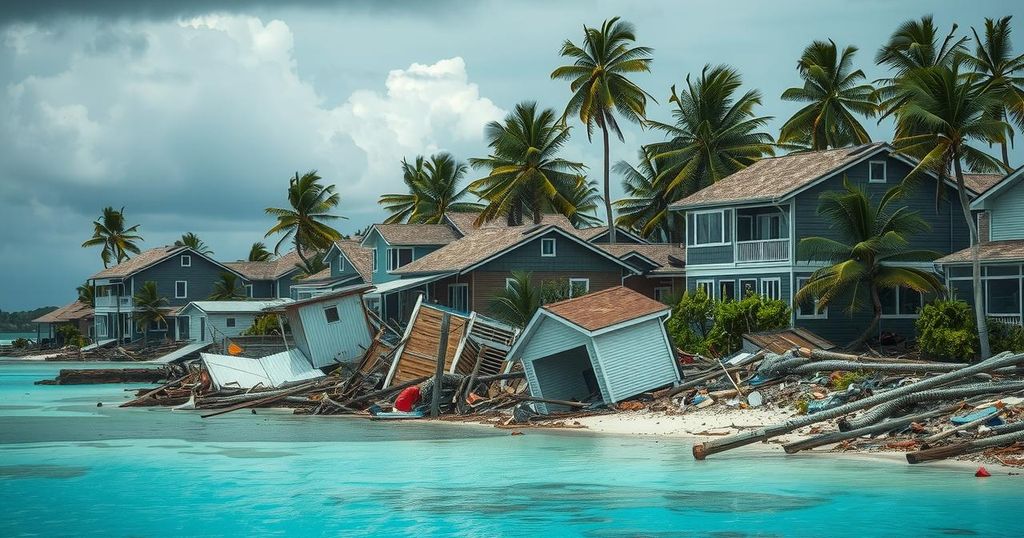Cyclone Chido Devastates Mayotte: A Call for Urgent Action and Reflection on Climate Vulnerability

Cyclone Chido struck Mayotte in December, causing unprecedented destruction and claiming at least 35 lives. The cyclone, with winds of up to 136 mph, was the worst in 90 years, leaving much of the island isolated and in dire need of assistance. Emergency aid efforts from the European Commission and various countries aim to support recovery, underscoring the region’s vulnerability to climate change and the importance of transitioning to renewable energy.
Cyclone Chido, a powerful Category 4 storm, drastically impacted the French archipelago of Mayotte in December, representing the most severe cyclone in nearly 90 years. The cyclone unleashed winds reaching up to 136 miles per hour, obliterating entire neighborhoods, schools, and hospitals, resulting in the unfortunate loss of at least 35 lives—a number that officials fear may increase. Following the storm, extensive damage left nearly two-thirds of Mayotte isolated, disrupting power and communication systems.
Estelle Youssouffa, a parliament member for Mayotte, emphasized the severity of the destruction, stating, “Everything has been razed.” The region, situated between Madagascar and Mozambique, has endured previous severe weather, including Cyclones Idai and Kenneth, which wreaked havoc just five years prior.
The devastation is particularly alarming as it highlights Mayotte’s vulnerability to climate change, as outlined in the French Development Agency’s strategy for 2022-2026. With the Earth experiencing increasingly extreme weather patterns, the likelihood of such catastrophic events is expected to rise, prompting urgent discussions on preventative measures and disaster preparedness.
In response to the disaster, the European Commission is facilitating emergency aid for the affected communities in Mayotte and Mozambique, while several countries, including Belgium and Germany, have extended their assistance. The Copernicus Emergency Management Service has developed analytical maps to support ongoing relief efforts, with nearly $1 million allocated for humanitarian aid in Mozambique, focusing on critical needs such as water, shelter, and healthcare services. The pressing situation accentuates the need for sustainable energy solutions to mitigate the effects of climate change predominantly affecting vulnerable regions.
Efforts to transition from fossil fuels to renewable energy sources such as solar, wind, and hydropower remain paramount in combating the growing threats posed by climate-related catastrophes. Such a shift not only aids affected regions like Mayotte but also contributes to a healthier planet for future generations.
The article discusses the catastrophic impact of Cyclone Chido on the archipelago of Mayotte, emphasizing the scale of destruction and loss of life as the region faces a significant natural disaster—its worst in 90 years. It provides context about the alarming frequency and intensity of extreme weather events exacerbated by climate change, illustrating the vulnerability of areas within the cyclone’s path. The responses from regional governments and international bodies to aid in recovery efforts are also highlighted, underscoring the importance of immediate humanitarian assistance and longer-term strategies to address the root causes of such disasters through sustainable energy initiatives.
In conclusion, Cyclone Chido’s impact on Mayotte exemplifies the devastating effects of climate change on vulnerable regions, necessitating immediate humanitarian responses and long-term strategies to enhance resilience. The loss of lives and destruction highlights an urgent need for global commitment to renewable energy solutions and disaster preparedness initiatives. As support flows in from various international entities, the focus must remain on sustainable development to prevent similar tragedies in the future while fostering an equitable response to climate challenges faced by affected communities.
Original Source: www.thecooldown.com







